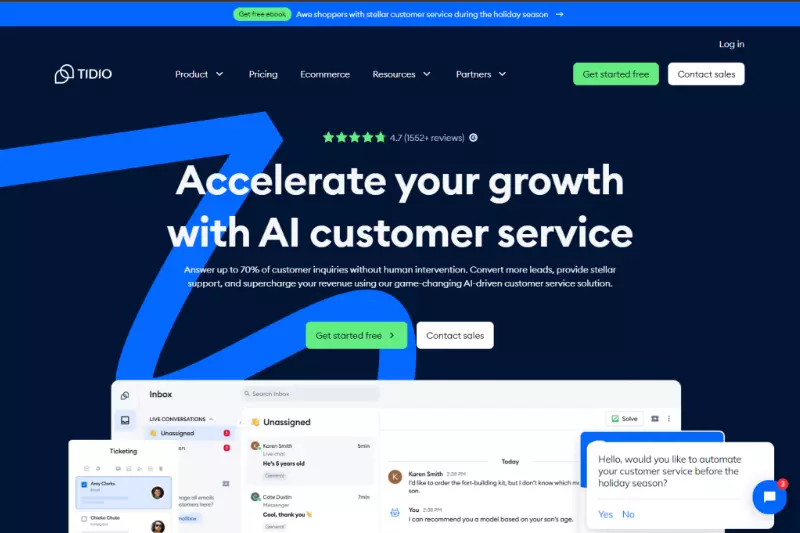With the growing demand for instant and seamless customer support, many businesses need help in providing 24/7 assistance while managing high volumes of inquiries. Traditional customer service methods like phone calls and emails could be faster, leading to customer satisfaction and missed opportunities. AI chatbot platforms have emerged as a solution to this problem, enabling companies to automate responses and engage with customers efficiently at any time.
This blog post aims to help you navigate the world of AI chatbot platforms by introducing the top options available. From enhancing customer support to improving user engagement, these platforms offer various features tailored to different business needs. By understanding what each platform brings, you'll be better equipped to choose the one that fits your company’s goals and enhances your customer service experience.
We’ll also cover key aspects to consider when selecting a chatbot platform, such as integration capabilities, ease of use, scalability, and security. Whether you're a small startup or a large enterprise, this comprehensive guide will help you identify the best AI chatbot platform for your business and explain why Copilot.Live stands out among the rest. This blog will provide valuable insights and practical recommendations if you want to improve customer satisfaction and streamline operations.
What Is An AI Chatbot Platform?
An AI chatbot platform is a tool that allows businesses to automate conversations with customers using artificial intelligence. These platforms enable companies to create virtual assistants to answer questions, guide users through processes, or make product recommendations. By leveraging AI, chatbots can handle many inquiries in real time, ensuring quick responses and enhanced customer experiences.
Most AI chatbot platforms include features like natural language processing (NLP) and machine learning, which allow chatbots to understand and respond to user input more effectively. These platforms are designed to integrate with various communication channels, such as websites, social media, and messaging apps, helping businesses stay connected with their audience across multiple platforms.
Best AI Chatbot Platforms In 2025
AI chatbot platforms are crucial to improving customer service and automating routine tasks in today's fast-paced world. Businesses of all sizes can benefit from these platforms by streamlining customer interactions and providing quick, accurate responses. However, choosing the best one for your needs can be difficult with so many available platforms. To make your decision easier, we've compiled a comparison table of the top AI chatbot platforms in 2025. Each platform offers unique features and tools to help businesses enhance customer support and increase overall efficiency.
1. Copilot.Live
.webp)
Copilot.Liveis a powerful AI chatbot platform that offers real-time support, helping businesses automate customer conversations efficiently. With its advanced AI capabilities, Copilot.Live can handle complex queries and ensure smooth communication across various channels. The platform's user-friendly interface and seamless integration with popular business tools make it a versatile choice for companies of all sizes. It is designed to enhance customer satisfaction while reducing response time, making it a top choice for customer-centric businesses.
Below Are Some Pros:
- Real-time communication.
- Easy integration with existing tools.
- Efficient in handling complex queries.
Below Are Some Cons:
- Slightly expensive for smaller businesses.
- Limited advanced AI features.
- Requires initial customization effort.
2. Botpress
.webp)
Botpress is an open-source chatbot platform that offers complete customization, making it ideal for developers and businesses with specific technical needs. It provides powerful natural language processing (NLP) and machine learning features to create highly intelligent chatbots. Botpress's robust architecture supports multi-channel communication and can be easily scaled to handle large volumes of interactions, making it a great choice for businesses with high traffic.
Below Are Some Pros:
- Fully customizable for technical users.
- Strong NLP and machine learning tools.
- Scalable for large businesses.
Below Are Some Cons:
- Requires coding knowledge.
- Limited support for non-technical users.
- The initial setup can be complex.
3. IBM Watsonx Assistant

IBM Watsonx Assistant is a highly advanced AI chatbot platform that offers top-tier AI and machine learning capabilities. It excels in creating intelligent virtual assistants that can handle various customer queries. IBM’s powerful AI technology allows Watsonx to understand and process natural language, providing accurate and context-aware responses. It integrates with multiple platforms and is known for its robust security features, making it a preferred choice for enterprises.
Below Are Some Pros:
- Advanced AI and NLP technology.
- Seamless integration with multiple platforms.
- Strong security features.
Below Are Some Cons:
- Higher cost for small businesses.
- Requires technical expertise.
- It can be complex to set up.
4. Kore.Ai

Kore.ai is a comprehensive AI chatbot platform that automates conversations across different channels. It offers easy-to-use tools for building chatbots with minimal coding, making it suitable for developers and non-technical users. Kore.ai supports a wide range of industries, from healthcare to finance, by providing tailored solutions for customer engagement, making it a highly versatile platform for businesses of all sizes.
Below Are Some Pros:
- Suitable for a variety of industries.
- Minimal coding is required.
- Flexible and easy to use.
Below Are Some Cons:
- Limited customization for complex use cases.
- Requires a paid plan for advanced features.
- Occasional lags during peak usage.
5. Dialogflow

Google’s Dialogflow is a well-known AI chatbot platform that leverages natural language understanding to create sophisticated conversational agents. It allows businesses to integrate chatbots into websites, mobile apps, and messaging platforms easily. Dialogflow’s ability to understand multiple languages makes it ideal for global companies, and it offers detailed analytics to help improve the chatbot’s performance over time.
Below Are Some Pros:
- Supports multiple languages.
- Detailed analytics for tracking performance.
- Strong NLP capabilities.
Below Are Some Cons:
- It can be expensive for large deployments.
- Requires some technical knowledge.
- Limited customization options for non-developers.
6. Amazon Lex

Amazon Lex is an AI-powered chatbot platform by Amazon Web Services (AWS) that allows developers to build conversational interfaces. It uses the same technology as Alexa, Amazon’s voice assistant, making it highly capable of text and voice interactions. Lex integrates easily with other AWS services, allowing developers to create scalable and secure chatbot solutions.
Below Are Some Pros:
- Advanced voice and text capabilities.
- Easy integration with AWS services.
- Scalable for large applications.
Below Are Some Cons:
- Requires AWS expertise.
- It can become costly with heavy usage.
- Limited tools for non-developers.
7. Uchat

Uchat is an easy-to-use AI chatbot platform that offers drag-and-drop functionality for creating chatbots without coding. It supports the integration of popular messaging platforms such as Facebook Messenger, WhatsApp, and Instagram. Uchat is ideal for small businesses and startups looking for a simple yet effective way to automate customer interactions without requiring advanced technical skills.
Below Are Some Pros:
- Simple drag-and-drop interface.
- Integrates with popular messaging platforms.
- Ideal for small businesses.
Below are some Cons:
- Limited features for large enterprises.
- Basic AI capabilities.
- Paid plans are required for advanced tools.
8. Appy Pie Chatbot

Appy Pie Chatbot is a no-code platform that enables businesses to build AI chatbots quickly and efficiently. It offers a user-friendly interface and pre-built templates, ideal for users with no technical background. The platform supports integration with multiple communication channels, making it an excellent choice for small—to medium-sized businesses looking to enhance customer service.
Below Are Some Pros:
- No coding is required.
- Pre-built templates for quick setup.
- Multi-channel integration.
Below Are Some Cons:
- Limited customization for advanced users.
- Basic AI capabilities.
- Paid plans are required for full functionality.
9. LivePerson
.webp)
LivePerson offers an AI chatbot platform that specializes in conversational commerce. It enables businesses to connect with customers through AI-powered messaging across different platforms, including SMS, Facebook Messenger, and WhatsApp. LivePerson is known for its strong focus on customer engagement and sales, making it a preferred choice for businesses looking to improve customer relationships.
Below Are Some Pros:
- Excellent for conversational commerce.
- Multi-channel messaging support.
- AI-driven customer engagement.
Below Are Some Cons:
- Expensive for small businesses.
- Requires advanced setup.
- Limited customization for non-technical users.
10. Yellow.Ai

Yellow.ai is an AI-powered platform that combines conversational AI with automation to deliver personalized customer experiences. It offers pre-built templates for various industries, such as eCommerce, healthcare, and finance, allowing businesses to deploy AI chatbots quickly. With support for omnichannel communication, Yellow.ai ensures customers receive seamless interactions across different platforms.
Below Are Some Pros:
- Industry-specific templates.
- Omnichannel communication.
- AI-driven automation.
Below Are Some Cons:
- Higher pricing for advanced features.
- Requires customization for unique use cases.
- Limited tools for small businesses.
11. Gupshup

Gupshup is a leading AI-powered chatbot platform that creates conversational experiences across multiple channels. It supports messaging apps like WhatsApp, Messenger, and SMS, making it ideal for businesses looking to engage with customers on their preferred platforms. Gupshup is highly scalable, suitable for enterprises with high customer interactions, and offers a drag-and-drop interface for easy chatbot creation.
Below Are Some Pros:
- Supports a wide range of messaging apps.
- Scalable for large enterprises.
- Easy-to-use drag-and-drop interface.
Below Are Some Cons:
- Limited features in the free plan.
- Some features require advanced technical knowledge.
- Customer support could be improved.
12. Tidio

Tidio is an AI chatbot platform focused on improving customer service for small and medium-sized businesses. It combines live chat and AI-powered automation, allowing companies to engage with customers in real time while automating routine tasks. Tidio’s user-friendly interface makes setting up chatbots without coding easy and integrates with popular platforms like Shopify and WordPress.
Below Are Some Pros:
- Combines live chat with automation.
- Easy setup, no coding required.
- Integrates well with eCommerce platforms.
Below Are Some Cons:
- Limited scalability for larger enterprises.
- Some advanced features require a paid plan.
- Customization options are limited.
13. Intercom
.webp)
Intercom is an all-in-one customer communication platform that includes an AI chatbot. It’s designed to help businesses provide personalized customer support and automate responses to common queries. Intercom’s strength is combining human and automated support, creating a seamless user experience. It also offers detailed analytics to help businesses improve their customer interactions.
Below Are Some Pros:
- Combines human and AI-driven support.
- Detailed analytics for performance tracking.
- Easy to integrate with existing CRM systems.
Below Are Some Cons:
- It can be expensive for small businesses.
- Complex for beginners to navigate.
- Limited customization without developer support.
14. WotNot
.webp)
WotNot is a no-code chatbot builder that allows businesses to create AI-driven chatbots easily. It’s ideal for companies that need to automate customer support and lead generation without requiring technical skills. WotNot supports omnichannel communication, allowing businesses to engage with users across various platforms, including websites, messaging apps, and social media.
Below Are Some Pros:
- No coding is required for chatbot creation.
- Omnichannel support for various platforms.
- Excellent for lead generation and support.
Below Are Some Cons:
- Limited features in the free version.
- Advanced features require a paid plan.
- Some integrations may be complex to set up.
15. Freshworks
.webp)
Freshworks offers an AI chatbot platform called Freddy, designed to help businesses deliver personalized customer service at scale. Freddy automates repetitive tasks, allowing human agents to focus on more complex queries. Freshworks integrates seamlessly with its suite of customer engagement tools, making it an excellent choice for businesses already using Freshworks products.
Below Are Some Pros:
- Seamless integration with Freshworks products.
- Automates repetitive tasks efficiently.
- Personalized customer service at scale.
Below Are Some Cons:
- Limited functionality outside the Freshworks ecosystem.
- It can be expensive for smaller teams.
- Requires setup time for optimal use.
16. Chatfuel
.webp)
Chatfuel is a user-friendly AI chatbot platform designed for Facebook Messenger, though it has expanded to support other platforms. It’s beneficial for businesses looking to automate their social media interactions. Chatfuel allows users to create chatbots without coding, offering pre-built templates to start quickly. It’s an affordable and efficient solution for small businesses looking to improve customer engagement.
Below Are Some Pros:
- Easy to use, no coding required.
- Great for automating social media interactions.
- Affordable pricing plans for small businesses.
Below Are Some Cons:
- Primarily focused on Facebook Messenger.
- Limited features for large-scale businesses.
- Advanced customization options are limited.
Key Aspects To Consider When Choosing A Chatbot Platform
Selecting the right AI chatbot platform involves more than picking a popular option. You must assess various factors to ensure the platform aligns with your business goals and operational needs. A well-chosen platform can boost customer engagement, reduce support workload, and offer a better user experience.
From understanding your requirements to ensuring secure and scalable solutions, there are vital aspects that businesses should consider. This section will break down these crucial factors to help you make an informed decision. Evaluating these elements carefully can help you choose a platform that meets both your current needs and future goals.
Understanding Your Needs
Before choosing a chatbot platform, it’s crucial to identify your business’s specific needs. Are you aiming to improve customer service, automate responses, or generate leads? Defining your objectives will help you choose a platform that meets those goals. Different platforms cater to various functions; some are better suited for support, while others excel in sales and marketing automation.
Effortless Integrations
A chatbot platform should integrate seamlessly with your existing systems, such as CRMs, marketing tools, or eCommerce platforms. Effortless integration ensures that data flows smoothly between your chatbot and other tools, enhancing functionality and improving customer service. Choosing a platform with flexible integration options saves time and resources and prevents disruptions to your business processes.
Omnichannel Support
Omnichannel support enables chatbots to operate across various platforms, such as websites, mobile apps, and social media channels. This allows businesses to meet customers wherever they are, improving accessibility and engagement. A platform that offers omnichannel support ensures a consistent experience across different communication channels, making customer interactions smoother and more effective.
Ease of Development And Use
A user-friendly platform is crucial, especially if you need more technical expertise. Some platforms offer drag-and-drop interfaces that allow users to create chatbots without coding. This makes it easier for non-developers to set up and manage their bots. A platform that prioritizes ease of use also reduces the time spent on training and deployment, helping businesses get started faster.
Security And Scalability
As your business grows, so will the volume of customer interactions. Choosing a scalable chatbot platform ensures it can handle increasing traffic without compromising performance. Security is another key factor, as chatbots handle sensitive customer data. To protect user data, ensure the platform complies with industry security standards, including encryption and GDPR compliance.
Deployment Options
Some platforms offer on-premise solutions, while others operate in the cloud. Choosing the right deployment option depends on your company’s infrastructure and security needs. Cloud-based platforms are more flexible and accessible to update, while on-premise solutions give businesses more control over their data. Choose a deployment option that aligns with your technical requirements and long-term goals.
Future of Chatbot Platforms
The future of AI chatbot platforms is bright, driven by advancements in natural language processing (NLP) and machine learning (ML). By 2025, it’s projected that 95% of customer interactions will be managed by AI chatbots, significantly improving customer experience by reducing response times and increasing accuracy.
As businesses increasingly adopt these technologies, chatbot platforms will integrate more deeply with existing business tools, enabling seamless operations and personalized support. Additionally, AI chatbots are expected to automate tasks beyond customer service, including data analysis and decision-making, paving the way for enhanced efficiency across various industries. Here are some key trends to watch:
- Improved NLP Capabilities:Expect chatbots to understand and respond to complex queries more accurately.
- Seamless Integrations:Deeper integration with business tools for personalized customer support.
- Wider Adoption:By 2025, 95% of customer interactions may be managed by AI chatbots.
- Automation Expansion:Chatbots will handle advanced tasks like data analysis and decision-making.
- Enhanced User Experience:More intuitive interactions will bridge the gap between human and AI communication.
Why Copilot.Live Is The Best Option
Copilot.Live stands out as a premier AI chatbot platform due to its exceptional features that are designed for real-time customer engagement. It combines advanced natural language processing with machine learning, enabling businesses to create highly responsive chatbots that understand and adapt to customer queries. With a user-friendly interface, Copilot.Live allows users to set up chatbots quickly, ensuring minimal downtime and fast deployment.
Moreover, Copilot.Live offers seamless integration with various business tools and platforms, making it easy to incorporate into existing workflows. Its analytics dashboard provides valuable insights into customer interactions, helping businesses refine their strategies and improve service delivery. With its focus on both user experience and operational efficiency, Copilot.Live is ideal for organizations seeking to enhance customer support and drive engagement.
Conclusão
Selecting the right AI chatbot platform is essential for businesses looking to enhance customer engagement and streamline operations. The platforms discussed include Copilot.Live offers various features tailored to different needs and goals. Companies can make informed choices that align with their objectives by considering key aspects such as integration capabilities, ease of use, omnichannel support, and security.
As chatbot technology evolves, investing in a robust platform will empower organizations to provide exceptional customer experiences and remain competitive in their industries. Embracing AI chatbots is not just a trend; it's a strategic move toward achieving operational efficiency and improved customer satisfaction.

%20(1).webp)
















